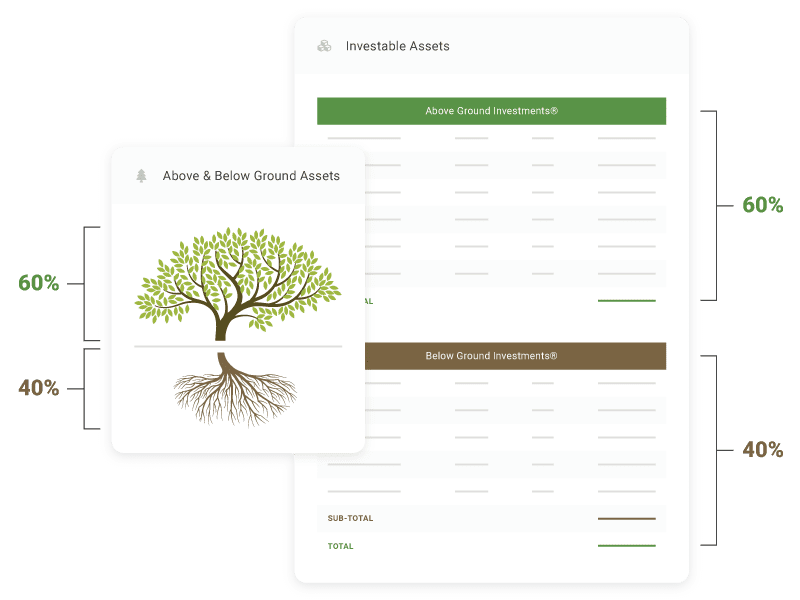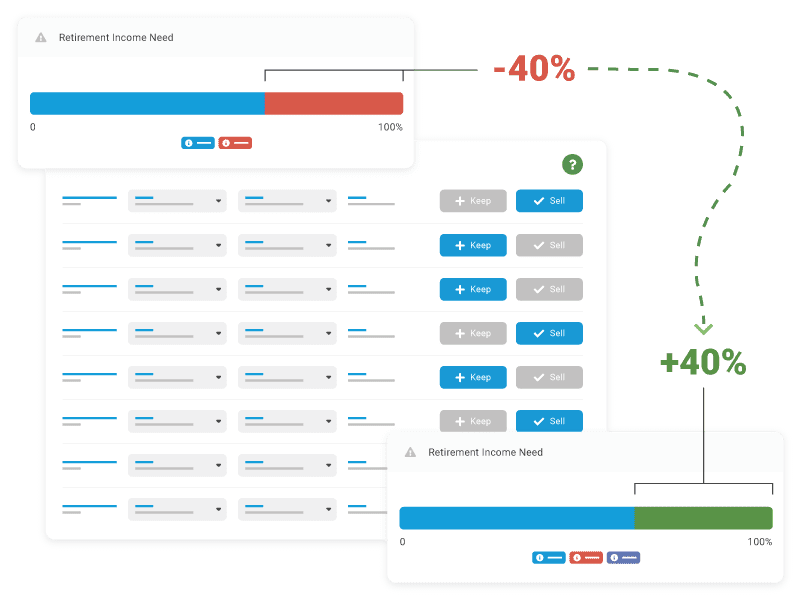Understanding the different types of tax-free income that can help you meet retirement goals
For many people, the thought of retirement conjures up images of long days spent relaxing on the beach or playing golf. But in reality, retirement is a time when you need to be extra careful with your money. One of the biggest challenges you’ll face during retirement is making your nest egg last.
Fortunately, there are a number of things you can do to increase the longevity of your nest egg. One of the most effective ways is to take advantage of income sources that are free of tax from the federal government. With tax-free income, you’ll be able to keep more of your money invested and working for you. Ultimately, this can help you maintain your standard of living throughout retirement.
Throughout this article, we’ll take a closer look at some of the various sources of income, how tax-free retirement income can benefit you, and the importance of seeking the assistance of financial advisors to help navigate the rules and regulations associated with this source of income.

Understand the different types of tax free income – Kaizen Wealth Management
Tax-Free Income Credits and Sources
Many people believe that they only have to pay taxes on their employment income. However, this is not always the case. There are a variety of different ways to earn money that may not be subject to taxation. This is called “tax-free income.” Knowing what qualifies as tax-free income can help you maximize your earnings and keep more of your hard-earned money.
Earned Income Tax Credit (EITC)
The Earned Income Tax Credit (EITC) is a refundable tax credit for low- and moderate-income workers. To qualify, you must have earned income from employment or self-employment and meet other requirements. The amount of the credit depends on your income and family situation.
Child Tax Credit
The Child Tax Credit is a credit for taxpayers who have dependent children under the age of 17. As of the date this article was written, the credit is worth up to $3,600 per child. To qualify, the child must meet the IRS’s definition of a dependent and cannot provide more than half of their own support.
Retirement Account Withdrawals
Withdrawals from traditional IRA and 401(k) accounts are typically subject to taxation as ordinary income. There are some exceptions to this rule, such as using the funds to pay for qualified educational expenses or medical insurance premiums if you’ve been unemployed for at least 12 weeks. However, withdrawals from a Roth IRA are not subject to federal taxes as long as they meet certain requirements. This includes withdrawal of both contributions and earnings.
Rental Income
If you own rental property, the rent you collect is typically considered taxable income. However, there are some expenses that can be deducted from this income, such as depreciation, repairs, and marketing costs. These deductions can help reduce your overall tax liability.

Understand if your social security benefits are considered tax free income – Kaizen Wealth
Social Security Benefits
Social Security benefits are typically taxable if your “combined income” exceeds a certain threshold. Combined income includes your adjusted gross income plus any nontaxable interest plus one-half of your Social Security benefits. If your combined income exceeds $25,000 (or $32,000 if you’re married and filing jointly), up to 50% of your benefits may be subject to taxation. If your income exceeds $34,000 (or $44,000 if you’re married and filing jointly), up to 85% of your benefits may be subject to taxation.
Qualified Dividends
If you receive dividends from a company that you own stock in, those dividends are “qualified” if they meet certain criteria. These criteria can change depending on the tax year, for example, this article shows the 2021-2022 rates. For example, the dividends must have been paid out by a U.S. company or a qualifying foreign company, and they must have been held by you for at least 60 days before they were paid out. Qualified dividends are taxed at the lower capital gains rate rather than your regular income tax rate.
Interest on Municipal Bonds
Municipal bonds are debt securities the state and local governments issue to finance public projects like roads, bridges, and schools. The interest you earn on municipal bonds is exempt from federal income taxes, and may also be exempt from state and local taxes depending on where the bond was issued. This makes them a popular investment choice for people wanting to minimize tax liability.

Are capital gains tax free – Kaizen Wealth
Capital Gains
When an investment is sold for more than its purchase price this is a captial gain. Capital gains are taxed at a lower rate than other types of income, and in some cases, they may be exempt from taxation altogether.
Gifts and Inheritances
With a few exceptions, you may not need to pay taxes on gifts or inheritances you receive. For example, if you sell an inherited piece of property for a profit, you’ll have to pay capital gains taxes on that profit just as you would if you had sold any other piece of property that you owned. According to Investopedia.com, “Inheritance taxes are collected by six U.S. states: Iowa, Kentucky, Maryland, Nebraska, New Jersey, and Pennsylvania. Whether your inheritance will be taxed, and at what rate, depends on its value, your relationship to the person who passed away, and the prevailing rules where you live.”
The Benefits of Tax-Free Retirement Income
Tax-free retirement income from your investments can be extremely beneficial. Particularly if you’re nearing retirement age. If you’re in a high tax bracket, receiving taxable interest or dividend payments can result in a hefty chunk of your investment being lost to taxes.
However, perhaps the most obvious benefit that comes from tax-free retirement income is you’ll have more money to work with since you won’t be paying taxes on it. Having a significant boost in cash flow can be helpful, especially for those on a fixed income.
Another benefit of tax-free retirement income is it can help you keep more of your money invested. Since you won’t have to pay taxes on it, you’ll be able to reinvest all of your earnings and let them continue to grow tax-deferred. This can have a significant impact on the growth of your nest egg over time, help generate retirement income, and potentially assist you in maintaining your standard of living throughout retirement.

Work with a financial advisor to ensure your tax free income is working with your financial plan
Bringing in a Financial Advisor to Help
The first step in minimizing your taxes is to understand your current tax situation. What types of income are you receiving? Are you taking advantage of all the deductions and credits? What assets do you have that are working for you and which ones aren’t?
Seeking the advice of a financial advisor can help in answering these questions. A financial professional is able to provide a host of services, including helping you understand what tax-free income is, how to get it, and how to use it to your advantage. For example, a certified financial planner can help you plan for retirement by creating a personalized path. For business owners, a professional can help structure your business in a way that minimizes your taxes owed while maximizing your retirement savings.
Tax-Advantaged Accounts
There are several types of investment accounts that offer tax advantages where your money grows tax-free, such as Roth IRA, 401(k)’s, and 403(b)’s. A financial advisor can help you determine what is right for you based on your circumstances and goals. For example, if you are nearing retirement, a Roth IRA may be a good option because withdrawals are tax-free retirement income whereas someone who still has time until they retire may want to consider a roth 401 k.

Maximize your contributions and investments with the help of a financial advisor- Kaizen Wealth Management
Maximize Deductions and Credits
Working with a financial professional can also help you take advantage of deductions and credits you may not be aware of. If you have any losses on investments such as stocks or mutual funds, you may be able to offset some taxable income by claiming those losses on your return. This can be a complex process. Having professional advice can be not only reassuring, but helpful.
Invest in Tax-Free Investments
Understanding the different types of investments can be intimidating. Working with financial advisors can help you understand what tax-free investments work for your retirement savings goals. While we’ve mentioned a few above, you can find a comprehensive list of 7-tax-free investments. By investing in these types of assets, you can earn income without having to worry about paying taxes on it.
Plan for Retirement Withdrawals
Finally, when it comes to retirement withdrawals, there are several strategies that can minimize your taxes. Selecting what is best for your individual situation is crucial. For example, if you have a traditional IRA, you may be able to convert it to a Roth IRA which would allow you to take tax-free withdrawals in retirement. Seek the help of a financial professional if this is something you’re considering. They can help guide you through the process and understand what’s happening along the way.

Ready for tax free income?- Kaizen Wealth Management
Ready For A Tax-Free Retirement?
There are many types of income that can be classified as “tax-free.” While this means you many not have to pay any federal taxes it’s important to know what types of income are truly considered tax-free.
Just a few examples include qualified dividends, interest on municipal bonds, and a Roth IRA. By taking advantage of these tax-free sources of income, you can reduce your overall tax liability while earning free income in retirement. After all, who wouldn’t want to boost their retirement nest egg with the additional savings?
When it comes to maximizing your tax-free income, there are many benefits to working with a financial advisor, especially if you are looking for ways to reduce your taxes and increase your returns. Here at Kaizen Wealth Management, our financial advisors assist you with financial questions and can help you reach your goals of living a tax free retirement, educate you on purchasing term life insurance, or other investment concerns.
For more information, check out our Tax Savings for Retirement article and contact us today for a free consultation.



